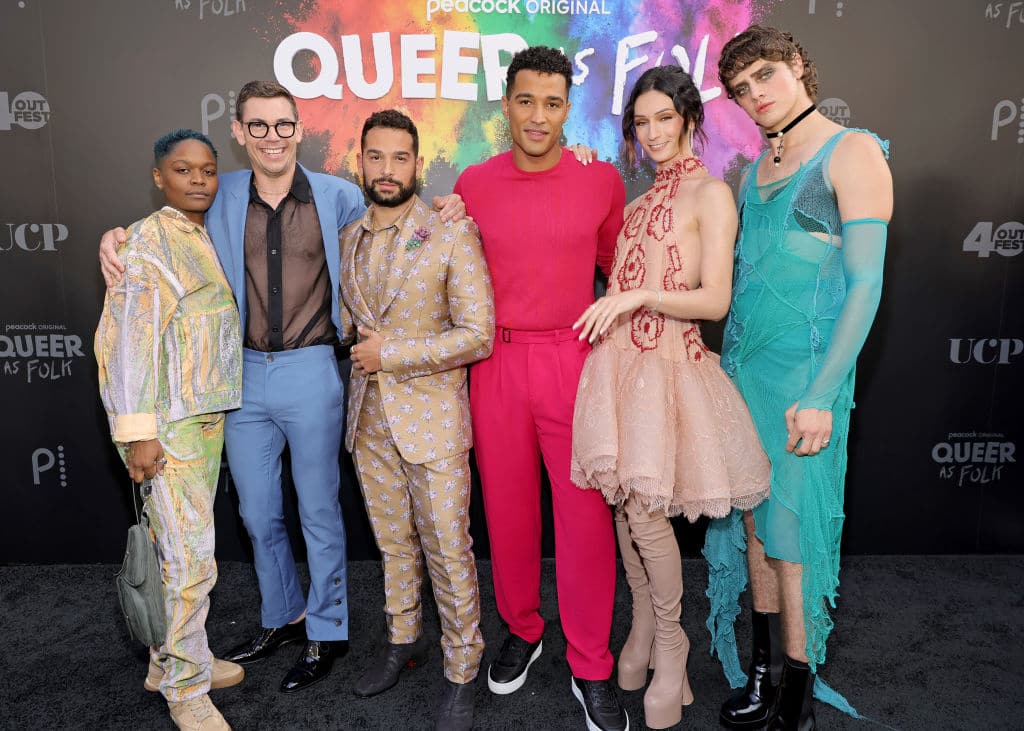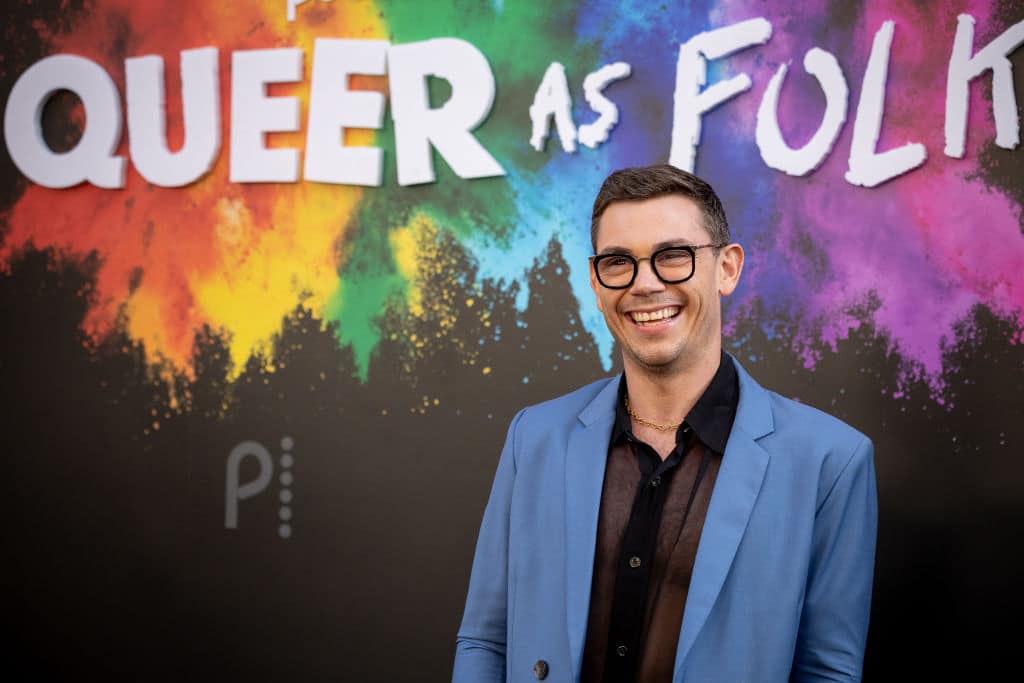Queer as Folk cast explain why show needed urgent reboot: ‘I had a complicated relationship with it’

Queer as Folk stars Fin Argus and Ryan O’Connell. (STARZ)
The 2022 version of Queer as Folk is far from a “nostalgia cash-grab”, say actors Ryan O’Connell and Fin Argus.
When the original Queer as Folk debuted in the UK more than 20 years ago, it taught a generation of teens about loving, living – and yes, rimming – as out and proud gay men.
Nobody could have predicted just how much would change in the years that followed for LGBTQ+ people. Many of us now enjoy marriage rights, legal gender recognition, protections from discrimination – but across the world, some things remain stubbornly the same.
One of those is that LGBTQ+ people still aren’t safe to live their lives freely and openly without the threat of violence and discrimination.
That’s why Queer as Folk matters so much to Ryan O’Connell and Fin Argus stars of the 2022 reboot. O’Connell, creator and star of Netflix’s Special, plays Julian, a gay man with cerebral palsy, and is also a writer on the show. Argus plays Mingus, a non-binary 17-year-old whose life changes forever when he’s shot at during his drag debut.
The revival explores the impact traumatic events have on the LGBTQ+ community, but more than anything, it shows how queer people come together and carry each other through, even when the going gets tough. What’s more, it explores and celebrates a much wider swathe of the LGBTQ+ community, centring disabled people, women, trans and non-binary people and queer people of colour – something the original failed to do.
PinkNews caught up with O’Connell and Argus to talk about anti-LGBTQ+ legislation, rewriting the narrative for queer disabled people, and why representation still matters.
PinkNews: A lot of people will be coming to this new version of Queer as Folk having been fans of the original versions. What was it like coming to this revival knowing the impact this show has had?
Ryan O’Connell: None of the characters in the current iteration of Queer as Folk could have existed in the previous iterations, so I think that alone is sort of like, “Wow, this is a reboot that really needs to exist,” unlike a lot of [reboots] which are just nostalgia cash-grabs. I was really excited because I watched Queer as Folk, the US version, when I was 12 years old. I was closeted, it was my first peek into queer life, and it was invigorating and corny and all of these things, but it was also like, “OK, being queer and disabled is going to be a bumpy f**king road!” So I had a very complicated relationship to the original which makes it all the more meaningful to be part of the reboot.
Fin Argus: For me, I hadn’t watched it growing up – the show came out when I was one year old. But I did go back to watch it, and it’s really cool to see that it’s always had this legacy of groundbreaking, explicit queer content. We’re just seeing that in a modernised version that represents a wider array of queerness, and I love that.

CG, Ryan O’Connell, Johnny Sibilly, Devin Way, Jesse James Keitel and Fin Argus attend Peacock’s “Queer As Folk” World Premiere Event. (Amy Sussman/Getty)
The show deals with a mass shooting, and the Pulse nightclub massacre will naturally loom large in people’s minds watching it. How did you make sure it was sensitively handled?
Fin: Well first of all, Stephen Dunn, our creator and showrunner, wanted to make sure that we were as sensitive and thoughtful as possible when telling a story that involves so much pain and has affected so many people in America, specifically the Latinx community… It’s always tough but we felt that the story was worth telling because unfortunately, this is a harsh reality that queer people face. I don’t feel safe in this country as a queer person, and I have been threatened. It’s a scary reality so filming that was also really harrowing.
Ultimately the goal of the show is to allow people to empathise with and humanise the experience of queer folks who have experienced this deep trauma and stay with them after that event takes place, because that’s not what defines them as people. You can experience that trauma and still live a full, happy, fulfilling, sexually liberated life, and that’s what our show is all about – highlighting that healing process and that community-building that comes after, and that’s true of what happened with the Pulse nightclub shooting.

Ryan O’Connell. (Getty)
Ryan: As a writer, I thought it was a very important opportunity to humanise survivors of gun violence. Unfortunately gun violence is so pervasive in America that it is very easy to become numb to it all and for people to become a statistic. I always wondered, what happens to these people afterwards – how do they rebuild their lives? Because nobody’s checking in with them after the fact. So the opportunity to examine what that looks like was really necessary and not something I’ve seen done before.
The show also explores sex and disability, most notably in episode four which deals with a sex party. Ryan, what was the significance of that scene for you?
Ryan: Yeah, so I co-wrote that episode with Alyssa Taylor, so hats off to her. I feel like as a disabled person society chopped my d**k off at birth and I’ve spent my entire life trying to find it again. I think that disabled people have been denied feeling sexy, feeling desirable, feeling sexual. I thought this was a great opportunity. Also, Julian’s not the only disabled person in this show, there’s Marvin (played by Eric Graise), so to me the most interesting part of this wasn’t even showing a sex party, it was showing Marvin and Julian, their similarities and also their differences, because they’re so, so different as people, but because of their disabilities there are some commonalities in how they view relationships and how they move through life, and so that was a real thrill. Usually if a disabled person is included at all, it’s just them, but having Marvin and Julian to play with and their dual perspectives, that was just a delight.
This show really feels like it’s made by queer people for queer people, which stands in stark contrast to a lot of TV shows. Was that important to you?
Fin: Yeah, absolutely. [Growing up] I would jump at any opportunity to watch anything queer related in TV and film and I loved seeing myself represented, but when I dug deeper and I was like, “Who is this character?” and then I’d find out [the actor] was straight, or they were cis. They maybe did a marvellous job acting, but there’s only one way to bring true nuance and authenticity to playing a queer character and I feel like that’s just being a queer person and speaking on your own lived experience. I think that adds a layer of depth to queer storytelling.

Fin Argus as Mingus in Queer as Folk. (Peacock)
When I met with Stephen [Dunn] prior to being cast in this show, he impressed on me the importance of casting queer folks in these roles, and that got me so excited to be part of the project because it’s revolutionary in the sense that it’s an entirely queer cast and a queer production. Every step of making this has been done or influenced by queer folks. And then it becomes a show that feels authentically queer and actually speaks to the queer community because it’s literally in our voice.
Ryan: Yeah, I think with the first raft of queer storytelling there was a need to be like, “Don’t worry, queer people aren’t scary – they’re just like straight people. They want the white picket fence, they want to get married, marriage equality, etc, etc” – so there was this desire for them to appear palatable and not like the other. I think now, thankfully, we’ve moved past that and we are able to delve into, actually, no, queer people do live different lives and it’s those differences that make them unique and special and we shouldn’t shy away from that. That is very reflected in Queer as Folk.
View this post on Instagram
This show is coming out in an era when queer people are so often under attack, whether that’s in state legislatures or on the streets. Do you feel that shows like Queer as Folk have a power to stand up against that?
Fin: I think the interesting thing about it being such a queer-specific show is that it also invites people who maybe aren’t queer to understand the reality of queerness, and that’s also why I feel like the subject matter is important, because people need to know that queer folks aren’t safe yet. We see a lot of queer representation in TV and film that is this sanitised version of queerness where their biggest hurdle is coming out and telling their parents that they have a boyfriend. That’s real, but in addition, America and a lot of places in the world are a dangerous place to be visibly queer, and that’s what our show brings to life.
There’s a lot of anti-queer and anti-trans legislation and additionally there are attacks specifically on Black trans women all the time and they are taking the brunt of this aggression. I think it’s important to highlight those experiences so people can understand that queer folks are just as human as you and we do need support. We need to be protected and that’s what this show is all about. It’s about humanising and empathising.
Ryan: Yeah it’s a really scary time, it’s a very confusing time. I think the world is inherently becoming more progressive so what we’re seeing is the old guard fight against that and the minority make these power grabs and succeeding at it. But it’s really, really important to remember that that is no longer the majority, that is not how the majority feels. Unfortunately the minority has made themselves very loud and very powerful so their opinions could carry real life consequences and they do. A show like this is more important than ever because it is defiant, it is unabashedly queer, and it shows there are more people with us than against us.
There are going to be a lot of younger people watching this show who might be coming to queer representation for the first time. What message would you send to those viewers?
Ryan: This show is for anyone who didn’t feel represented by the US and UK versions – AKA, me. In order to be yourself you have to see yourself, and I feel like I just want anyone who didn’t see themselves in the original or anyone who doesn’t fit the mould for what they think queerness is or what being gay is, this show is for you, baby. There is no right or wrong way to be queer. It is a choose your own f**king adventure, it’s as fun as hell, and there is space for you here.
Fin: My message would be, your community is out there and we are here to support you. Take all the time you need coming into yourself and inviting other people into knowing you, but whenever you’re ready, we are here with open arms.
Queer As Folk premieres on July 1 in the UK on STARZPLAY.

